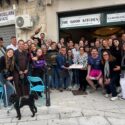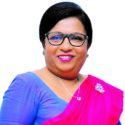
Margot Roache-Green is the 2023 San Francisco Admin Awards’ recipient of the Jeannette Castellano Lifetime Achievement Award, with an extraordinary career spanning 63 years… and counting!
Lucy Brazier (LB) interviewed Margot (MR-G) for our recent ES Global online conference. The full interview is available as an adminchat on our YouTube channel, and we have included the highlights from the interview below.
Margot’s career and life are a testament to the profound impact a dedicated individual can have on their community and beyond. Her story is one of resilience, commitment, and an unwavering desire to make a difference. She exemplifies what can be achieved when an Assistant asks questions and views their role as integral to the success of any endeavour, proving that being ‘just an assistant’ is a position of immense potential and influence.
Margot’s journey as an administrative professional began during a time when career paths for women were limited.
LB: What was it that inspired you to pursue a career as an administrative professional?
MR-G: It was the key to getting into business. Living in Washington DC, the federal government was a major employer; if you could type, you could always get a job. And it was always women typing and producing documents. Whilst in high school, my first job was as a short-order cook. However, that job had a large administrative component to it. I had to do the schedule for the workers, compare what was purchased to what was sold, and close out the cash register after the shift. So, there are administrative functions in every job and at all levels.
LB: Right from the beginning, you had an overwhelming commitment to education. How did you juggle your education and your career?
MR-G: It was not easy. It took a long time; it took me 10 years to get a degree. They were wonderful years. But I was a teenage mum. It wasn’t something I planned. There’s a lot of backstory behind that. I knew the only way out, to take care of my family, was to be educated. Education, I think, is the key to most things.
I had to develop skills. With the help of my family, I worked three part-time jobs and went to school, and still found enough time, for the most part, to at least read a book to my kids before they went to bed. Sometimes I was exhausted, but that was a commitment that I had. My mum helped me out a lot. It’s an old African proverb, and it’s always a cliche, I’m sure, that it takes a village to raise a child. People in the neighbourhood were very supportive. I didn’t do it by myself – it was with the help of others.
Education was a freedom for me. It allowed me to be productive as a worker, as a mum, and also to have a fairly decent life. Those were the things that I strived for.
LB: Was there a pivotal moment when you decided that you wanted to make a difference in the community? Because so much of your work has been about that?
MR-G: The community is only as good as the people in it. You have to have some kind of commitment and be a part of it to make a difference.
In this country (the USA), you’re always compared to something, and Black people have been marginalized and told, “You’re not as smart.” I knew I was as smart as anybody else. I was not above average. But what is average? Growing up, I saw youngsters that had a lot of talent, but would never go anywhere. And I’m saying, “Why don’t you?”.
I just thought that I had a commitment, as a person of colour, to see what I could do to make a difference in other’s lives because people made a difference in mine. Not to contribute to it is, I think, neglectful.
LB: Your efforts in establishing health centres in marginalized communities back in the 1960s were groundbreaking. How did you establish a need? And what obstacles did you face in making this vision a reality?
MR-G: You know, what is interesting about that? I was a secretary at this consulting firm. They found out that certain parts of the country did not have adequate health care. This firm had gotten a big contract with an agency to help develop healthcare.
As the secretary, whilst I was sitting there typing, I kept looking at this stuff, and I’m saying, “Gee, you’re trying to establish roles for people in the community to participate in this effort to develop a partnership with health centres, so they would start using the facilities.”
Down South, even though there were facilities, they could only go maybe once or twice a week; they created their own kind of health care. They used a lot of herbs and even had folk doctors and folk medicine. And in South Carolina, in particular, they had a worm problem. This consulting firm was getting together a group of doctors to mitigate this problem.
I was looking at these reports, and I started asking my boss, “Why are you doing this? Are you involved with them? And what kind of role are these people going to play?”. I was asking so many questions, my manager said, “Why don’t you come with u, so you can take notes?” But as I went, I saw things, because I was part of a community that had been disenfranchised. I knew what a dual health system was all about. I said, “You got to bring them in the fold. You have to put them on the board to at least hear them if you want them to utilize that system. Because if you create a system and there’s no utilization, you’ve wasted your money. You need to let them be a part, go and find out who the leaders are in the community”, which I thought was very simple.
They had not thought about some of those things because they were high-level doctors and psychiatrists. They didn’t think about the basic grassroots. I think that’s where administrators often come in. They see things differently because they’re involved in all aspects of a business. And so, as a secretary, I then became a consultant. They would run things by me before they did stuff. And that was such a reward.
That goes to show, if you really want to know what’s happening, ask the administrator.
LB: You just kept on seeing things, didn’t you? In the 1980s, you looked at women on welfare, and you looked at farm workers, and you decided that you wanted to empower them and give them economic self-sufficiency. How did you go about that? And how did that idea come about in the first place?
MR-G: I was involved with a workforce development program. The program was geared towards farm workers because it was seasonal. When the picking season is over, what do you do with people who are unemployed, as opposed to them just getting aid? It was amazing to me because the farm workers would be out in the fields, and they had developed their own solar panels. They would have a frame, and they would put foil on this frame, and then the sun would hit the foil and would heat up the water or their food for lunch. You’re talking about energy conservation. I was working with this program, as an administrator.
Because of my community work, I always felt that anybody could do almost anything within reason. But we minimize capacity. I realized that these farmworkers had capacity because they had survival skills. And even though some of them were monolingual, there were ways that they could translate their skills into a business acumen that would pay off for them.
The governor of California was looking for solar installers. I wrote proposals to say that people can be trained to do these installations. These farm workers were trained to do those installations and assembled manufacturing parts for computers. Technology was just beginning. And at that time, Silicon Valley had a lot of manufacturing before they took it offshore.
Some of the farm workers and other community members had established skills that were transferable to other areas. Many of them also became part of the homeless population. You’d be surprised at the profile of some of the homeless people, who at one time were gainfully employed. Because of the economy, things changed for a lot of folks.
My role is still to try to inform the community to go back to school, to find a skill, and, even if they don’t go to college, find something that they do well and enhance that. My role now is to make sure kids who should be college-bound are helped to find scholarships. And, for those who can’t, there’s training. Electrical workers or plumbing are skills that are needed; they pay well and can afford you a better life. And you become major contributors.
LB: You’re still working as an Assistant at this point (1980s)?
MR-G: I was an administrator on paper and taking an Assistant salary. I never had a job that I didn’t like, because I always found goodness in everything. There were tasks, that I didn’t like to do, but I did them. I always looked at what I did in relation to the goal and the relationship to what the mission is; I always wanted to make sure there was a correlation.
And when I saw the skew, I would speak up and say, “We’re doing things that don’t make sense. It doesn’t really lead us to what it is we’re trying to do.”
LB: You moved to IBM in the ‘90s and you were still looking at how to help your community.
MR-G: I went to IBM as an administrator. After the farm workers project, it was like a utopia for me. You could go into their stock room and it was like walking into Office Depot. You could pick up anything you needed. But I also saw a lot of waste.
As an administrator, I thought, “Gee, this company has so much money.” I was so used to community programs. I learned a lot about technology, but I also learned a lot about waste. They must have realized we were wasting money, too, because they started downsizing.
And so, I wrote up a user guide for things that the secretaries were able to do and I got a big award for that. That was fun.
I used to say, “Don’t waste your time. You’re an engineer; we could do that for you.”
But that’s how you make sure people are focused. You start realigning, and that creates good jobs, too. “What can I take from this professional job, which doesn’t necessarily require engineering but requires skill?” And I handed it off to somebody else and we used that to create and secure jobs.
We see a lot of that now as they try to introduce AI. AI is a challenge for us, but you still need that human scent.
LB: Tell me about using technological advancements to embrace change, bridge gaps, and foster connections with your community.
MR-G: Technology is great. Of course, it has glitches like anything else, but it allows you to collect data to make good decisions, create jobs, create educational opportunities, inform the community of what’s going on, and really make the community a part of new technology. It has a lot of good elements; it can bring the community together, it can serve as an educational vehicle, and it already does. It’s important that everybody has access.
Almost everybody has a cell phone now. You don’t have landlines; you don’t have telephone booths. The cell phone is really a minicomputer. Teach people how to use it properly and use that as a means of bringing a community together.
I noticed that after two or three years, some of our laptops went kaput. As the administrator, it was my job to make sure that when our computers stopped working or were no longer under warranty, we e-waste them and wipe the data. We had certain requirements to protect customer data.
Once I had done that, I gave them away to senior citizens because they could get a hard drive for $39.95 from Amazon.
Someone reported me. They said, “You can’t do that. You have to protect client data.”
I said, “Well, here’s the client data in this box.” It would cost us thousands of dollars to e-waste because it’s by weight. And we had tons of it. I protected the data, because I took out the hard drives, and then I just gave away the computers.
The CEO said, “Oh, Margot, don’t worry. You won’t lose your job; you did the right thing.”That process is in consideration for adoption; it is strongly being considered as it goes through the chain of command.
LB: You’re a great advertisement for common sense; just look at how many people have benefited! Your Pathway to College and Career program came next and has opened many doors for Oakland’s underserved youth. Can you share a success story that particularly stands out for you?
MR-G: There’s quite a few. I was on the board of the East Oakland Youth Development Center for 20 years. And this is in the killing fields of our city, where we have high crime rates. We have a lot of drug abuse. We have domestic violence. We have a lot of ills because people are disenfranchised, they’re unemployed, but they have this big facility for youth in that community. We started the Pathway to College and Career program by knocking on doors of businesses, saying, “Would you be willing to just give a little money to help us establish a scholarship fund?” We got a good response. Even Amazon gave us close to a million dollars.
And we had diamonds in the dust. Two of them at Stanford, pre-med. We have educated several thousand kids who had no future. You hear a lot about negative parenting, but some are working two or three jobs to make ends meet. The kids were raising themselves. Some kids went home after school to cook dinner for the younger siblings. We had a home-alone cooking class, and the kids learned how to cook. And a couple of them wanted to be chefs – they’ve gone to culinary schools. They have been able to send many kids to not only the Ivy League schools but also HBCUs and other colleges throughout the country. It’s been a phenomenal response, because people, businesses, in particular, want to be a part of a success story. It’s good marketing for them, it’s good for the community, and it’s just the right thing to do. Crime is expensive, polarizing, devasting, and detrimentla to everyone including the perpetrator.
Everyone has a purpose, skills, and abilities. We just have some people with biological or environmental issues that affect their success. But education is the key –education and training. Everyone doesn’t have to go to university, but everybody can be a contributor. We just need to find out what they have. That can be a contributing factor to the environment, to their families, to the community, and to life in general. Life is such a gift.
LB: Where does your passion come from, Margot?
MR-G: As a teenage mum, I had some rough times. Prior to delivery, I was having some issues, so I had to go to the emergency room, and the police department came in to interrogate me for two hours. They thought I had gone to an abortionist. It was awful. Finally, an intern came by and said, “This young girl is having contractions”, and he was able to take me, and I had a two-pound baby, who survived.
That is my son. He has three wonderful girls, all educated. One is currently teaching in Korea. I made sure that I was going to be a good mum; I was going to do all I could because of the negativity that I felt. That’s not the only incident; there’ve been several incidents where people would say, ” You’re not like other Black people.” But there’s always this element that you’re less than, and I was always going to prove that no, we’re the same as, and even more in some instances.
LB: At the end of last year, you were awarded the Jeanette Castellano Lifetime Achievement Award at Sunny Nunan’s Admin Awards. I know that that recognition meant a huge amount to you both personally and professionally. Can you talk to me a little bit about that?
MR-G: When I got that award, I was just amazed. Actually, I got an award from my company for getting the award. My family and people I worked with were there, and then I saw the other people in the audience and how they were so revved up. Sonny’s mum’s career was unbelievable. To be associated with someone of that calibre, I’m still high. It has given me more incentive. I always say that I’m going to die young at an old age.
Even at 80 and expecting to relocate, I’m already trying to find my path when I get there, to be involved in the community and to also volunteer somewhere as an administrator. Administration is so key to everything we do. And the administrator is, in fact, the catalyst for almost every business.
They may try to eliminate us through AI, which they will not be able to do. Technology is great, but you still need, like I said, a human scent to implement certain things. But that Admin Award and organisation is just unbelievable. Money is great because you’ve got to have it, but when you get recognized by your peers, there’s nothing like it.
LB: Even now, you’re still working. How do you balance your commitment to your profession, and to your community, and make sure that your life is balanced as well?
MR-G: I have two grandkids that still live with me, one in the 11th grade and the other one is second-year college. And I have five gorgeous granddaughters, all smart. I’m very proud of them.
My therapy is to make hats; I’m a milliner. Being a milliner keeps me out of the medicine cabinet. I’m not on antidepressants or anxiety medications, and it keeps me off somebody’s couch. Those are viable things when you encounter issues, but millenary has enabled me to replace that. I guess I’ve done it so long since I was a mum at 16 that it’s just second nature. And I love music. That’s the universal medication. I like chamber music, classical, rhythm and blues. When I need to rebalance, I listen to music and mould a hat. Technology has helped me with my community commitment because I do some meetings online. And I’m still working on some scholarships, connecting with people, and sending letters. Technology has helped to facilitate my going out and meeting with people. I do the e-meet and e-greet. It keeps me alive.
LB: What are you going to do when you retire?
MR-G: I will never retire. I will stop working for pay. Millinery is my passion and my hobby. It is very therapeutic. I plan to create a millinery website called Margot’s Chapeaux, where I will showcase and retail my work. My motto is “Nothing elevates your look more than a chapeau”. I have a wonderful husband I’ve been married to for 58 years. He’s very low-key. I’m out there. He’s very supportive. He’s very quiet. We’re just the opposite. But we have a wonderful marriage.
LB: What advice would you give to administrators who aspire to make a difference in their communities and beyond?
MR-G: Know that administration is the nucleus of all we do, whether it’s running a business, or being a parent. It’s a nucleus to life. Everything we do, even paying our bills. All of that is administration.
It’s a set of organised skills to accomplish something. Everything you do can be transferred to other things. Just working is not enough. Do something for someone else. It completes you as a person. It’s the sharing of your skills, knowledge, time, and love.
Please care about yourself. When you care about yourself, you learn to care for others.
The skills that you have in administration will never get old. We can get technology, but that’s not people. It doesn’t have feelings. We still need that touch. And you are the ones who can give it.













